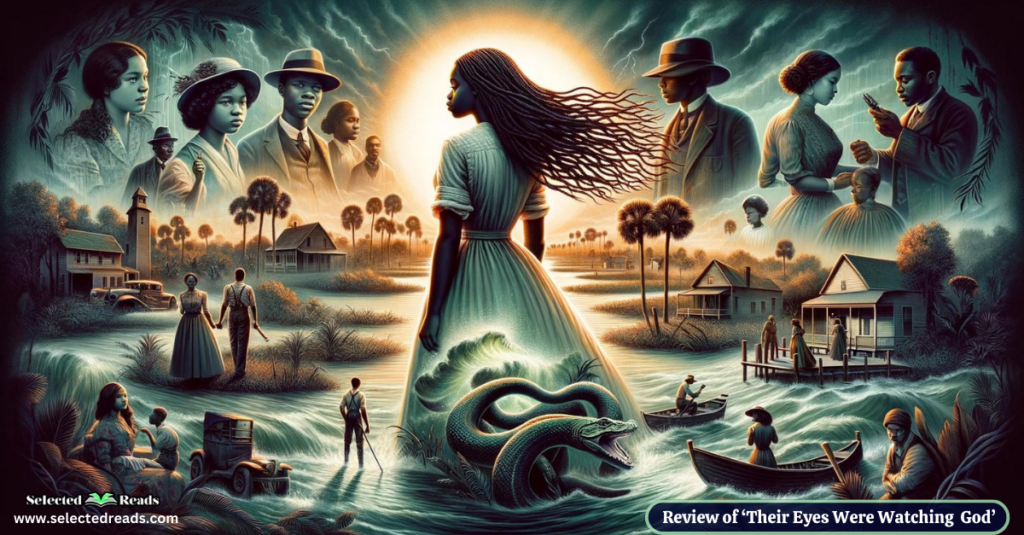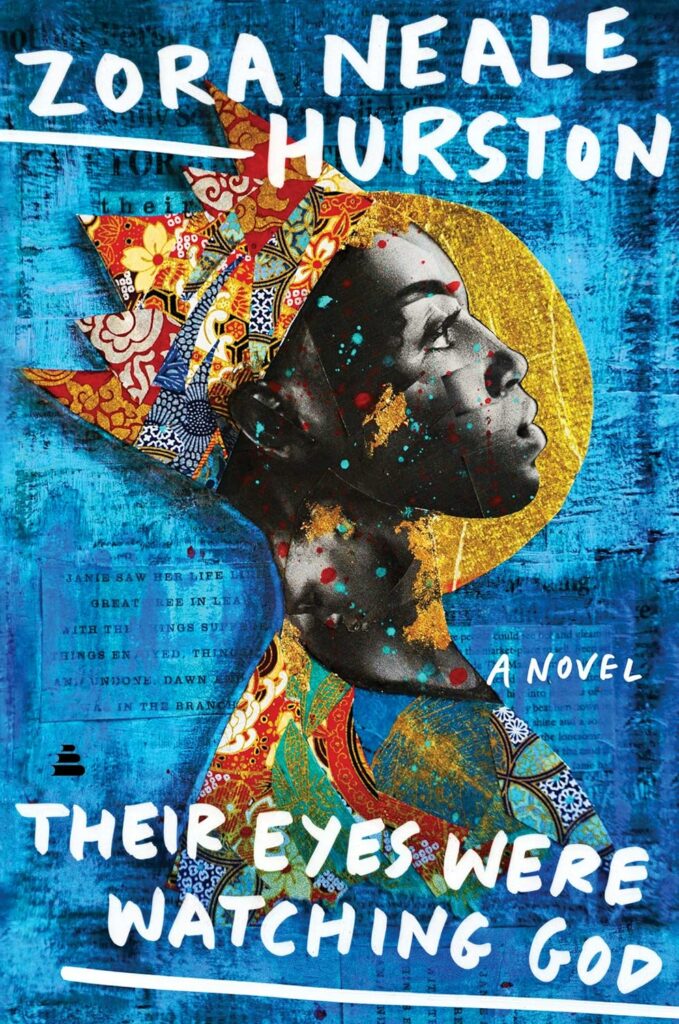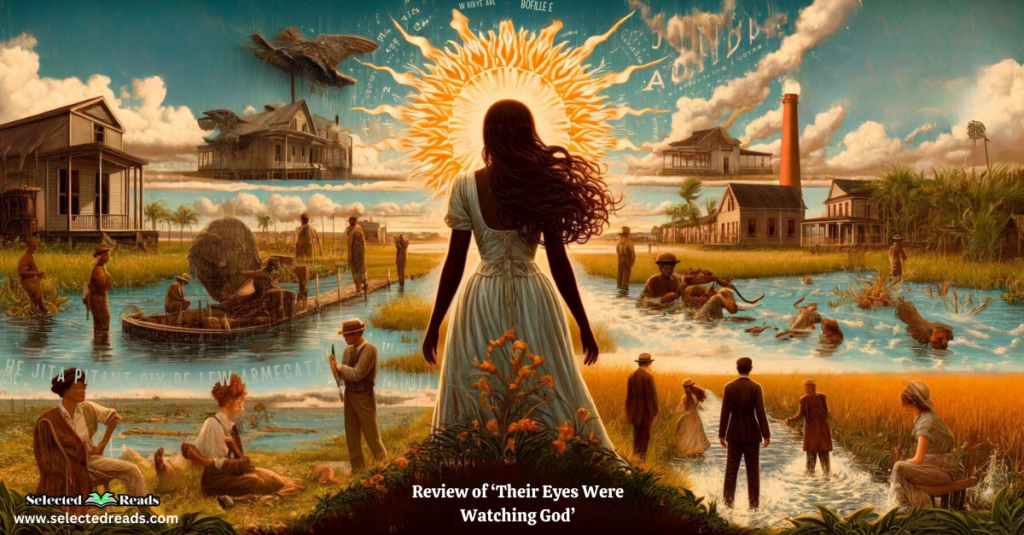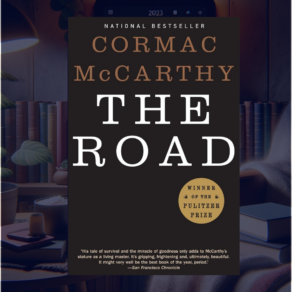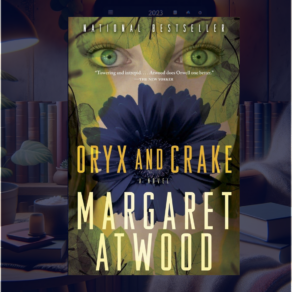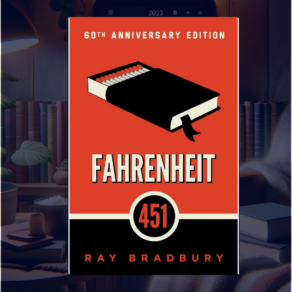Today, I’m thrilled to share something truly exceptional for enthusiasts of classic literature: “Their Eyes Were Watching God.” This post aims to introduce you to this landmark novel without giving away any key plot points. Here’s how we’ll navigate our exploration: We’ll begin with an overview of the narrative, setting the stage for what makes this story so captivating.
Following that, we’ll delve into the characters who breathe life into this tale, each contributing to its depth and richness. To conclude, I’ll present a series of stimulating questions designed for book club discussions or personal reflection, encouraging a deeper engagement with the themes and revelations of this masterpiece.
Their Eyes Were Watching God Summary
“Their Eyes Were Watching God” by Zora Neale Hurston is a powerful and evocative narrative that explores the life of Janie Crawford, a Black woman in the early 20th century South, through her journey toward self-discovery and personal freedom. The story unfolds over several decades of Janie’s life, beginning with her recounting her experiences to her friend Pheoby Watson upon returning to Eatonville, Florida.
Janie’s tale starts with her upbringing by her grandmother, Nanny, who marries her off to an older man, Logan Killicks, for security rather than love. Dissatisfied with this loveless and laborious marriage, Janie leaves Logan for Joe Starks, a charismatic man with ambitions to create a life of significance in the all-Black town of Eatonville. As Joe becomes the mayor and a successful businessman, Janie finds herself trapped in another unhappy marriage, relegated to the role of a trophy wife. Despite the material comforts, she yearns for emotional connection and independence.
Photo: Amazon
After Joe’s death, Janie embraces her newfound freedom, defying societal expectations by wearing her hair down and running Joe’s store her way. Her independence attracts Tea Cake, a younger, vibrant man who offers her the love and companionship she has longed for. With Tea Cake, Janie experiences true love and adventure, moving to the Everglades to work alongside him in the bean fields. Their relationship, though marked by jealousy and, at one point, violence, represents Janie’s first experience of a partnership where she feels valued and alive.
Their happiness is cut short by a devastating hurricane that leads to Tea Cake’s infection with rabies. In a tragic climax, Janie is forced to shoot Tea Cake to save herself as he succumbs to the disease’s madness. Through this painful decision, Janie realizes the depth of her love for Tea Cake and the strength she possesses within herself.
The novel concludes with Janie returning to Eatonville, where she shares her story with Pheoby, conveying the lessons she has learned about love, freedom, and the importance of living life on her own terms. Throughout her journey, Janie’s struggle to find her voice and identity in a world that seeks to silence her is a testament to the human spirit’s resilience and the power of self-actualization.
Related: The Souls of Black Folk Summary
Their Eyes Were Watching God Themes
Here’s a concise bullet list of the themes explored in Zora Neale Hurston’s “Their Eyes Were Watching God”:
- The Search for Identity: Janie’s journey toward finding her voice and self-understanding amidst societal expectations.
- Love and Relationships: The evolution of Janie’s understanding and experience of love through her three marriages, reflecting on the dynamics of companionship, respect, and equality.
- Gender Roles: The critique of traditional gender expectations, highlighting Janie’s struggle for autonomy and her challenge against the roles prescribed to her as a woman.
- Freedom and Independence: The pursuit of personal freedom and the ability to live life according to one’s own terms, central to Janie’s character development.
- Community and Belonging: The exploration of Black community life, particularly in Eatonville and the Everglades, and the significance of belonging and communal support.
- Race and Racism: Subtle commentary on racial identity and internalized racism, set against the backdrop of Black communities’ resilience and solidarity.
- The Role of Nature: Symbolism of nature as a force of freedom and unpredictability, with significant events like the hurricane illustrating the interplay between human life and the natural world.
Their Eyes Were Watching God Characters
In “Their Eyes Were Watching God,” Zora Neale Hurston introduces us to a cast of characters who play pivotal roles in Janie Crawford’s life and journey of self-discovery. Each character contributes to the thematic depth of the novel, reflecting aspects of love, autonomy, societal expectation, and gender roles.
- Janie Crawford – The protagonist of the story, Janie is a resilient and introspective woman whose quest for her own identity and genuine love takes her through three marriages and various trials. Her journey is one of self-discovery, empowerment, and, ultimately, self-realization.
- Nanny Crawford – Janie’s grandmother, who raises her. Having been born into slavery and suffered greatly, Nanny dreams of security for Janie. Her experiences lead her to marry Janie off to Logan Killicks at a young age, believing this will ensure her granddaughter’s safety and stability.
- Logan Killicks – Janie’s first husband, an older farmer who Nanny believes will provide stability and respectability for Janie. However, Logan’s pragmatic and unromantic approach to life and marriage leaves Janie feeling trapped and unhappy, prompting her to leave him.
- Joe “Jody” Starks – Janie’s second husband, a charismatic and ambitious man who becomes a prominent businessman and the mayor of Eatonville. Joe is domineering and strives to shape Janie into his ideal of a respectable mayor’s wife, which stifles her independence and voice.
- Vergible “Tea Cake” Woods – Janie’s third husband and true love. Tea Cake is younger than Janie, lively, and genuinely cares for her. He teaches Janie to shoot, play checkers, and fish, symbolizing her growth and independence. Their time in the Everglades and the challenges they face together, including a devastating hurricane and Tea Cake’s tragic death, highlight the depth of their love and Janie’s personal growth.
- Pheoby Watson – Janie’s best friend in Eatonville. Pheoby represents a sympathetic ear and a safe space for Janie to express her thoughts and feelings. It is to Pheoby that Janie recounts her life story upon her return to Eatonville, serving as a frame for the narrative of the novel.
- Mrs. Turner – A character who represents internalized racism and classism. She befriends Janie in the Everglades because of Janie’s light skin and tries to set her up with her brother, revealing the complexities of race and societal expectations within the community.
Their Eyes Were Watching God Book Club Questions
Here are some questions that can serve as a starting point for your book club’s exploration of Zora Neale Hurston’s masterpiece:
- Exploring Janie’s Journey: How does Janie’s quest for her identity and autonomy evolve throughout the novel? In what ways do her relationships with Logan, Joe, and Tea Cake contribute to her self-discovery?
- The Role of the Setting: How do the settings—Eatonville and the Everglades—serve as more than just backdrops in Janie’s story? Consider how they reflect the themes of community, freedom, and confrontation with nature.
- Themes of Love and Partnership: Janie experiences different types of love in her three marriages. How do these relationships shape her understanding of love and partnership? What does the novel suggest about the nature of true love?
- Gender Dynamics and Expectations: Discuss how “Their Eyes Were Watching God” addresses gender roles and expectations. How does Janie challenge these societal norms? How do other characters conform to or rebel against these expectations?
- Voice and Silence: The theme of voice—both literal and metaphorical—plays a significant role in the novel. How does Janie’s voice, or lack thereof, symbolize her empowerment or oppression at different points in her life?
- The Use of Dialect: Zora Neale Hurston’s use of dialect is a significant aspect of the novel. How does the use of authentic dialogue contribute to the character development and overall authenticity of the narrative?
- Nature as a Character: Consider how Hurston personifies nature in the novel. What role does the hurricane play in the story, and how does it affect the characters and their community?
- The Concept of the American Dream: In what ways does “Their Eyes Were Watching God” explore the idea of the American Dream? How do the characters’ aspirations reflect or challenge this concept?
- Racial Identity and Solidarity: Although not the main focus of the novel, race plays a crucial role in shaping the characters’ experiences. Discuss how Hurston addresses issues of race and solidarity among the African American community.
- Legacy and Reception: “Their Eyes Were Watching God” was out of print for several decades before being rediscovered. Why do you think it was initially rejected by audiences and critics, and what has contributed to its enduring significance in American literature?
Related: Purple Hibiscus Summary
Final thoughts
In closing, it’s my hope that this brief exploration has piqued your interest in “Their Eyes Were Watching God.” This novel is a profound piece of literature that offers rich insights into the human experience. For those who haven’t yet had the pleasure, I strongly encourage diving into its pages. You’re in for an unforgettable journey.



